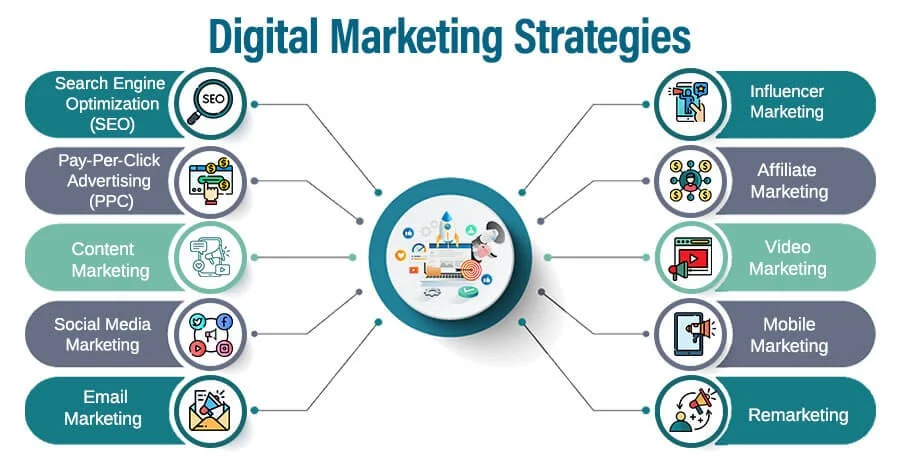In the digital age, where attention is earned in seconds and competition is growing every minute, showing up with intention creates a real difference. A thoughtfully crafted digital marketing strategy offers clarity, consistency, and a strong foundation for growth.
It guides every move, from content and channel selection to campaign goals and performance evaluation. More than a plan, this strategy is a reflection of your brand’s ambition, a map that aligns vision with action.
Now more than ever, having a future-focused approach is essential, and 2025 brings exciting new shifts that make a strategic mindset even more impactful.
Why Digital Marketing Strategy Matters Before Anything Else
Success online begins with direction. A strategy helps ensure that every step supports your bigger goals, bringing efficiency, focus, and a unified message to everything you do.
With a powerful digital marketing strategy, your brand can:
- Set clear, achievable goals aligned with business growth
- Reach the right audience, in the right way, at the right time
- Choose platforms based on audience behavior and intention
- Create content that educates, inspires, and converts
- Monitor and evolve based on real-time performance data
Core Elements of a Strong Digital Marketing Strategy

A well-structured digital marketing strategy doesn’t just happen; it’s built with clarity, purpose, and consistency. Below are the six essential components that form the backbone of a powerful digital plan.
1. A Compelling, High-Performance Website
At the heart of every digital marketing strategy is your website. It’s more than a digital brochure; it’s your first impression, your brand’s home, and often the beginning of your customer journey. That’s why a website should reflect your brand clearly, offer intuitive navigation, and perform smoothly across all devices.
Key elements for a standout website include
- Fast-loading pages
- Full mobile responsiveness
- Clear menu structure for easy browsing
- Balanced visuals and content
- A professional, trustworthy appearance
- Technically sound, SEO-ready infrastructure
2. Search Engine Optimization (SEO)
SEO is the key to being seen. It ensures that your website ranks higher on search engine results pages by optimizing both technical and content-based elements.
With a strong SEO strategy in place, your site attracts more organic traffic, builds trust, and reduces advertising costs over time. Appearing in search results boosts brand credibility and brings you closer to users when they’re actively searching for what you offer.
Core SEO actions include:
- Keyword research and intent mapping
- On-site SEO (content and structure optimization)
- Off-site SEO (backlink strategies)
- Technical SEO audits and improvements
- Local SEO for regional relevance
3. Content Marketing
Content marketing builds relationships before transactions. By offering valuable, informative, and relevant content, your brand builds awareness, earns trust, and guides your audience through their journey, from curiosity to conversion.
An effective content strategy may include:
- Blog articles, how-to guides, and eBooks
- Engaging video content and educational webinars
- Visual infographics that simplify data
- Podcast episodes that tell your story
4. Email Marketing
Email continues to be one of the most direct, personal, and impactful ways to connect with both existing and potential customers. It nurtures relationships and drives action through consistent, tailored communication.
Use email marketing to:
- Share new blog posts or updates
- Send cart reminders and personalized offers
- Launch exclusive loyalty programs
- Promote subscriber-only campaigns
5. Social Media Marketing
Social media offers a bridge between your brand and its community. It creates two-way conversations, builds trust, and grows visibility. When used strategically, it becomes a powerful tool for engagement, feedback, and brand-building.
Important elements of a social strategy include:
- Selecting platforms based on audience behavior
- Planning a consistent content calendar
- Running interactive campaigns and promotions
- Partnering with influencers for brand exposure
- Using reels, stories, and live sessions to connect in real-time
6. PPC Marketing (Pay-Per-Click Advertising)
PPC campaigns deliver quick visibility and targeted traffic through platforms like Google Ads, Meta Ads, or LinkedIn Ads. With precision targeting and real-time metrics, PPC plays a major role in accelerating campaign goals.
To make the most of PPC, focus on:
- Accurate keyword targeting
- Audience segmentation for personalized ads
- Compelling ad copy and eye-catching visuals
- Optimized landing pages
- Smart budget management and performance tracking
Digital Marketing Trends Shaping 2025
Digital marketing continues to evolve, and 2025 introduces fresh opportunities that are already redefining how brands connect with their audiences.
1. AI-Driven Personalization
Artificial intelligence now plays a major role in audience engagement. From automated content recommendations to smart ad targeting, AI helps brands deliver more relevant experiences faster.
2. Voice and Visual Discovery
More users are speaking or snapping their way through search. Optimizing for voice assistants and visual recognition tools creates new ways for customers to discover your brand.
3. Micro-Influencer Collaborations
Niche creators bring trust, authenticity, and community. Partnerships with micro-influencers open doors to highly engaged audiences, especially in the lifestyle, beauty, tech, and education sectors.
4. Short-Form Video Takes the Spotlight
Quick, engaging videos continue to dominate on social platforms. Behind-the-scenes stories, customer reactions, and value-packed tips help keep your brand top of mind.
5. Privacy-First Digital Marketing
Data ethics and transparency take centre stage. Brands that adopt consent-driven strategies and prioritize user trust are building stronger, more sustainable relationships.
Who Builds the Strategy?
While the concept is clear, bringing a digital marketing strategy to life takes time, experience, and adaptability. That’s where expert guidance comes in.
Partnering with a creative, insight-driven team like Pella Global Marketing means working alongside professionals who turn vision into action and complexity into clarity.
Here’s how we contribute to your growth:
- Custom strategies built for your business goals
- Fresh, data-informed creative across platforms
- Consistent campaign management and refinement
- A dedicated team aligned with your long-term success
Let’s talk and explore what your brand can achieve next.